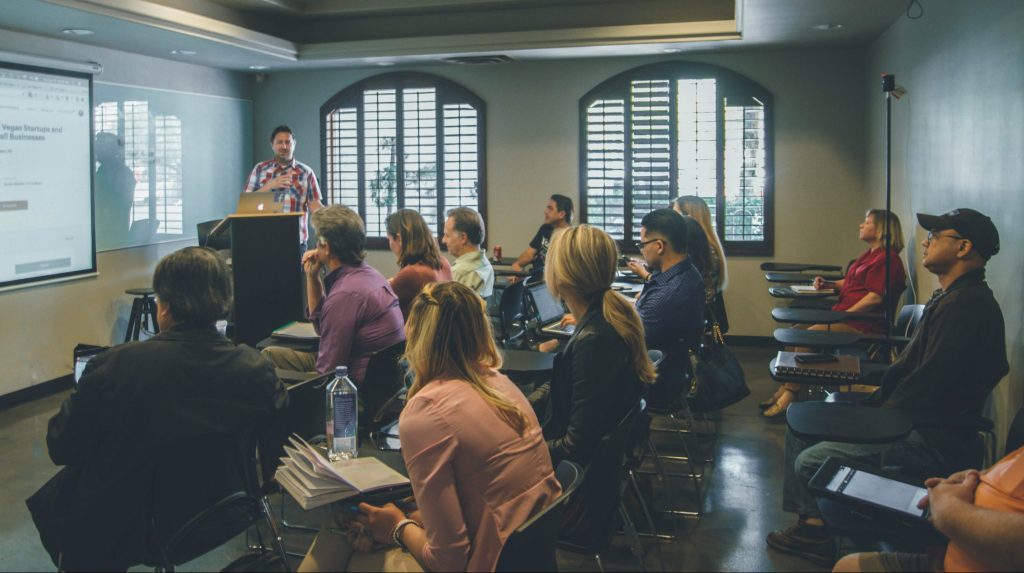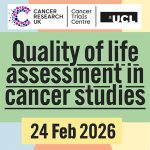Learning and Development Opportunities for Researchers and Trialists
The Network, and its member CTUs, are committed to sharing their knowledge of best practice in clinical trials research from the absolute fundamentals of trial development and management to the use of the latest novel trial designs.
Below you can find out about some of the upcoming learning and development opportunities taking place across the Network.
Some events are open to all and allow for online registration and payment. Others are limited to staff at Registered CTUs.
Use the links below to find out more.

January 2026
Title: Entering patients into cancer clinical trials
Date: 13 January 2026 (10:00 – 13:00)
Venue: 90 Tottenham Court Road, London
Cost: Non-profit – £50, For-profit – £100
Course lead: Laura Hughes (CR UK & UCL CTC)
This session gives a comprehensive overview of the clinical pathways cancer patients can take to be eventually referred for trial entry.
The first part of the session spans across the diagnostic methods and staging of cancer and gives a brief overview of the common tests carried out prior to trial treatment. In the second part of the session participants will learn about the importance of ensuring only eligible patients enter a trial and how eligibility criteria help to safeguard patients and differ amongst different phases of trials. They will also learn the importance of assessing treatment compliance and how every clinical intervention comes with a different set of challenges in collecting data about patient compliance.
For further information, and to book your place, please click here.
Title: A Masterclass in the Design and Conduct of Complex Intervention Evaluations
Date: 26 January, 2 February, & 9 February 2026
Venue: Online
Cost: Early bird (until 19 Decembers 2025) – £475, Full cost £525
This will be an online course, running across three consecutive Mondays on January 26th, February 2nd & 9th 2026.
Teaching will take place live online.
There will be a strong emphasis on practical exercises where participants will gain hands-on experience in the design and conduct of complex intervention evaluations, using a variety of real-life examples.
Topics covered include:
~ What makes an intervention complex?
~ An overview of existing frameworks.
~ The role of pilot and feasibility studies.
~ Trial design for complex intervention evaluation.
~ Intervention implementation and the role of a process evaluation.
~ Practical considerations in the set-up and delivery of complex intervention trials.
Registration is via the University of Leeds Store (link below). An early bird rate of £475 will be available until Friday 19th December 2025. The subsequent registration fee will be £525.
Registration will close on Friday 21st January 2026.
Book your place here.
February 2026
Title: Introduction to cancer clinical trials
Date: 5 February 2026 (10:00 – 13:00)
Venue: 90 Tottenham Court Road, London
Cost: Non-profit – £50, For-profit – £100
Course lead: Giulia Pellizzari (CR UK & UCL CTC)
This session provides a general introduction to cancer clinical trials for staff new to academic cancer studies.
Participants will get an overview on what clinical trials are and how they can have a preventative, curative or palliative aim. The session covers the practical and scientific reasons why we need clinical trials, what are the differences between Phase I, II, II and IV studies and the different methods of randomisation. The session also highlights how drug development trials in cancer differ from non-cancer studies and how the new era of targeted therapy and immunotherapy is changing the way cancer trials are designed.
For further information, and to book your place, please click here.
Title: Quality of life assessment in cancer studies
Date: 24 February 2026
Venue: 90 Tottenham Court Road , London W1T 4TJ
Cost: £100 (non-profit organisations). £200 (for-profit organisations)

*** Last registration date – 17 February 2026 ***
Aims
Health-related quality of life (QoL) is an essential outcome in contemporary clinical trials. This course will provide an overview of QoL assessment in oncology, including selecting appropriate QoL instruments and implementing, analysing, and interpreting QoL data across trial phases (I–III) and real-world studies.
The course will also cover incorporating QoL into grant applications and protocols, and its use in decision-making to support the implementation of new interventions into clinical practice (e.g. surgery or radiotherapy) or for market authorisation and market access of new cancer drugs. Sessions will be interactive and based on real-life examples.
Target Audience
This course is for researchers, clinicians, healthcare professionals and statisticians from universities, pharmaceutical companies, NHS, and regulatory and health technology assessment agencies. No prior knowledge of quality of life is required.
For further details, and to register, please click here.
Title: Cancer treatments and their side-effects
Date: 26 February 2026 (10:00 – 13:00)
Venue: 90 Tottenham Court Road, London
Cost: Non-profit – £50, For-profit – £100
Course lead: Giulia Pellizzari (CR UK & UCL CTC)
This session is a basic introduction to cancer treatments and their most common side-effects and adverse reactions.
The course provides an overview on cancer surgery, radiotherapy and chemotherapy we well as insights on the mechanisms of action of targeted therapies such as monoclonal antibodies, small inhibitory molecules, CAR-T cell therapy and immune checkpoint inhibitors.
In the second part of the session, participants will learn about the mechanisms of toxicity linked to the different categories of cancer therapy and how these are managed.
This course is not recommended for clinicians.
For further information, and to book your place, please click here.
March 2026
Title: Trial outcomes: what are we trying to measure?
Date: 5 March 2026 (10:00 – 13:00)
Venue: 90 Tottenham Court Road, London
Cost: Non-profit – £50, For-profit – £100
Course lead: Will Wilson (CR UK & UCL CTC)
This session, aimed at non-statisticians, will cover the most common primary outcomes measures used in early and late phase cancer trials.
Participants will learn what makes a good outcome measure, how outcomes measures are defined and what data need to be collected to assess the outcome, especially for tumour response assessment and time to event measures such as survival and disease (or progression) free survival.
For further information, and to book your place, please click here.
Title: Clinical Trial Management: Maximising Effectiveness
Date: 23 – 24 March 2026
Venue: Birmingham
Cost: £250 per person
Course lead: Razia Meer-Baloch (Birmingham CTC)
This two-day programme will focus on the fundamentals of the project management of trials. The teaching will be delivered through a combination of pre-recorded lectures; independent reading and live online sessions.
Trials that are successfully delivered on time and to the recruitment target require the employment of good project management. High quality data is driven through data and quality management processes, and these must be combined with an understanding of the trial safety reporting requirements, and the ongoing assessment and evaluation of trial risks.
The programme will explore how to plan for and respond to clinical trial challenges, maximising effectiveness, efficiency and data quality. It is aimed at individuals involved in trial co-ordination and management who have some experience, and who would like to build on this skill set.
For further information, and to book your place, please click here.
Title: Practical Use of Multiple Imputation to Handle Missing Data in Stata
Date: 25 – 26 March 2026
Venue: London
Cost: Early Bird Offer: £170 – Low Middle Income Countries (LMIC), £345 – Academic / not-for-profit organisations, £415 – For-profit organisations. Standard fees (After 27th February 2026): £185 – Low Middle Income Countries (LMIC), £370 – Academic / not-for-profit organisations, £444 – For-profit organisations
Course facilitators: Ian White (MRC Clinical Trials Unit, UCL), Angela Wood (University of Cambridge), Tim Morris (MRC Clinical Trials Unit, UCL)
Course Overview:
Our aim in this course is to provide participants with the ability to analyse their own data using multiple imputation, but also to be aware of the pitfalls and limitations of the technique. We will give plenty of practical examples from our own experience of analysing data in medical research. We welcome participants bringing their own data and problems, and one session is dedicated to discussion of some participants’ data.
Who Should Attend:
The target audience for this course is researchers needing to analyse incomplete data:
~ Attendees are expected to be familiar with running Stata from the command line (i.e. not using menus) at least to the level of fitting a regression model to complete data and producing simple graph
~ No prior knowledge of multiple imputation is assumed.
~ Participants will need a computer with the facility to run Stata 12
Structure:
Two mornings (25th March 09:30 – 17:30 / 26th March 09:15 – 16:30), featuring nine lectures and eight practical sessions.
For further information, and to book your place, please click here.
April 2026
Title: 5th Annual ICTU Contemporary Clinical Trial (ICCT) Course
Date: 15 April – 22 July 2026
Venue: In-person tutorials will take place at the ICTU Offices, Stadium House, White City, London
Cost: £1,100 per delegate

**THE GROUP SIZE IS LIMITED TO 10 DELEGATES SO EARLY REGISTRATION IS ENCOURAGED**
This bespoke programme is designed to equip Early Career Researchers and Emerging Lead Investigators with the essential skills to design and conduct a clinical trial. Each delegate will develop a protocol based on their own research question, supported by experienced ICTU staff in Clinical Trial Statistics, Methodology, Operations, and Clinical Data Systems. To gain the most from the course, we are looking for research questions that can be addressed using a randomised controlled trial (RCT) design.
To complete registration online, please follow this link: ICCT in person course registration 2026.
Registration forms will be reviewed and places offered on a rolling basis. Course registration will close once all places are filled.
Title: Sample size calculations in randomised clinical trials: Beyond the basics
Date: 28 April 2026
Venue: MRC CTU at UCL, 90 High Holborn, London, WC1V 6LJ
Cost: Early bird – Academic / Not-for-profit – £200, For-profit – £380 Standard fee (after 1 January 2026) – Academic / Not-for-profit – £250, For-profit – £475
Course Leads: Dr Babak Choodari-Oskooei, Ian White, Andrew Copas, Matteo Quartagno

Sample size calculations arise in planning a study. It is one of the most important aspects of any design since it drives study timelines and the cost of undertaking the protocol. It determines the degree of required information to robustly answer the primary research questions in the study. If the sample size is too small, the study is likely to be inconclusive. Furthermore, increasing sample size during the study can be expensive and time-consuming. Therefore, it is imperative to accurately estimate the required sample size and trial timelines from the outset, and particularly for any funding application.
This course builds on a basic course in sample-size calculations such as the one provided by the ICH, and provides an overview of the underlying statistical theory for sample size calculations within the hypothesis testing framework. It addresses practical issues and statistical considerations when calculating sample sizes for a wide range of advanced trial designs and outcome distributions, including factorial, non-inferiority, group sequential, and clustered randomised clinical trials. It uses real advanced trial examples to calculate the sample size using the available user-written software in both R and Stata.
It is suitable for those working on trials and study designs, which includes trialists, trial statisticians, clinicians and other scientists. Familiarity with the hypothesis testing framework (i.e., type I error rate, power, and various effect sizes) are essential. Familiarity with sample size calculation for simple/basic designs is desirable but not essential.
For further information, and to register, please click here.
May 2026
Title: Research Methods: Introduction to Randomised Controlled Trials in Healthcare
Date: 18 – 20 May 2026
Venue: Online
Cost: £600 per person
Course leads: Razia Meer-Baloch (Birmingham CTU) and Dr Sara Brookes (CRUK CTU)
Clinical trials have huge societal impact, providing the best evidence of the effectiveness of healthcare, social care and public health interventions. Research through clinical trials is a growing global business in academic institutions, industry, the NHS and across public health organisations. To ensure efficient trials that reach successful completion, trial staff require a solid grounding and knowledge of the design, conduct, analysis and interpretation of clinical trials.
This face-to-face 3-day course in Research Methods: Introduction to Randomised Controlled Trials in Healthcare organised by the Birmingham Centre for Clinical Trials (BCCT) provides an overview of the research process from idea and design to analysis and publication. This programme will be designed to combine theory with opportunities to apply knowledge to practice, and will be delivered in person with additional access to recordings and self guided readings.
Birmingham is well recognised for its research methods teaching with over 20 years’ experience of delivering short course CPD teaching in research methods, in addition to running a Master’s programme in Clinical Trials (MSc/PGDip/PGCert).
For further information, and to book your place, please click here.
June 2026
Title: Essentials of Clinical Trials
Date: 22 – 26 June 2026
Venue: London
Cost: £1,980 per person
Course organisers: Jennifer Nicholas, Matthew Dodd, and Eni Balogun

The Medical Statistics Department (MSD) at the London School of Hygiene and Tropical Medicine (LSHTM) will be running a short course on the essentials of clinical trials.
An exciting new treatment is showing promise for treating a devastating disease, but how do you know if it works in real life? From evaluating emerging technologies to finding out whether innovative approaches to improve newborn survival or increase vaccine uptake are effective, clinical trials can help answer questions like these.
This popular course, which has been running since 1999, offers a fast track to understanding the fundamental principles of randomised clinical trials. These gold standard experiments enable researchers to test potential solutions to health challenges on a large number of people and in different contexts. Evidence from clinical trials has made a huge impact on health and policy worldwide.
Experts actively involved in major global trials will provide key insights into the steps involved in designing, conducting and analysing a clinical trial. Through live lectures and practical sessions, you will gain a basic understanding and practical knowledge to apply the principles of clinical trials to the health issue you are interested in. The course can either be attended in person at LSHTM in London or online via video conferencing using Zoom.
The course is relevant for anyone interested in understanding the role of clinical trials in the rigorous evaluation of healthcare interventions, including clinical research professionals, research managers, statisticians and other scientists.
Please note that places on the course are limited and applying early is advised.
The course runs for 5 days from 22 to 26 June 2026.
**The Royal College of Physicians was awarded 30 Continuing Professional Development (CPD) credits for the June 2025 running of the course. An application is in progress for 2026**
For further information and an application form please visit: https://www.lshtm.ac.uk/study/courses/short-courses/clinical-trials
July 2026
No events are currently listed.
August 2026
No events are currently listed.
September 2026
Title: Improving Clinical Trial Delivery: Investigator Site Staff
Date: 21 – 22 September 2026
Venue: Online (University of Birmingham)
Cost: £250 person
This two day programme is designed to build understanding and efficiency in the ongoing site management and delivery of open trials. It is aimed at site delivery staff. The teaching will be delivered through a combination of pre-recorded lectures; independent reading and live online sessions.
For sites to achieve their recruitment target on time, in compliance with the trial protocol and with the collection of complete and accurate data, experienced and trained staff are required. This 2-day programme will focus on the management of trials from the perspective of the Principal Investigator and the site delivery team. It will explore clinical trial challenges such as the factors that can affect successful participant recruitment, data quality and the challenges in the assessment and reporting of safety data. It will focus on the impact of protocol deviations on patient safety and data credibility and will improve comprehension of the rationale for specific trial activities.
For further information, and to book your place, please click here.
October 2026
No events are currently listed.
November 2026
Title: Clinical Trial Management: Maximising Effectiveness
Date: 16 – 17 November 2026
Venue: Birmingham
Cost: £250 per person
Course lead: Razia Meer-Baloch (Birmingham CTC)
This two-day programme will focus on the fundamentals of the project management of trials. The teaching will be delivered through a combination of pre-recorded lectures; independent reading and live online sessions.
Trials that are successfully delivered on time and to the recruitment target require the employment of good project management. High quality data is driven through data and quality management processes, and these must be combined with an understanding of the trial safety reporting requirements, and the ongoing assessment and evaluation of trial risks.
The programme will explore how to plan for and respond to clinical trial challenges, maximising effectiveness, efficiency and data quality. It is aimed at individuals involved in trial co-ordination and management who have some experience, and who would like to build on this skill set.
For further information, and to book your place, please click here.
Title: Research Methods: Introduction to Randomised Controlled Trials in Healthcare
Date: 23 – 25 November 2026
Venue: Edgbaston Campus, University of Birmingham
Cost: £600 per person
Course leads: Razia Meer-Baloch (Birmingham CTU) and Dr Sara Brookes (CRUK CTU)
Clinical trials have huge societal impact, providing the best evidence of the effectiveness of healthcare, social care and public health interventions. Research through clinical trials is a growing global business in academic institutions, industry, the NHS and across public health organisations. To ensure efficient trials that reach successful completion, trial staff require a solid grounding and knowledge of the design, conduct, analysis and interpretation of clinical trials.
This face-to-face 3-day course in Research Methods: Introduction to Randomised Controlled Trials in Healthcare organised by the Birmingham Centre for Clinical Trials (BCCT) provides an overview of the research process from idea and design to analysis and publication. This programme will be designed to combine theory with opportunities to apply knowledge to practice, and will be delivered in person with additional access to recordings and self guided readings.
Birmingham is well recognised for its research methods teaching with over 20 years’ experience of delivering short course CPD teaching in research methods, in addition to running a Master’s programme in Clinical Trials (MSc/PGDip/PGCert).
For further information, and to book your place, please click here.
December 2026
No events are currently listed.
Flexible Online Training
Title: Introduction to Randomised Controlled Trials
Date: Anytime
Venue: Online course on FutureLearn
Cost: Available via subscription
Course Lead: Razia Meer-Baloch, Birmingham CTU
Discover the importance of trials in evidence-based medicine and learn about the trial lifecycle from conception to publication.
This course has been built by a team of expert research trial staff from the Birmingham Centre for Clinical Trials within Birmingham University. This team will guide you through the entire process for conducting randomised controlled trials and how to report results that can then be used to inform guidelines.
This course is designed for new or existing clinical trial staff. It may also be of interest to anyone looking to learn more about the wider randomised controlled trials process.
For further information, and to register, please click here.
Title: Introduction to Data Management in Clinical Research
Date: Anytime
Venue: Online course on FutureLearn
Cost: Available via subscription
Course Lead: Razia Meer-Baloch, Birmingham CTU
Improve the quality of medical research with clinical data management tools to collect, manage, and store trial data effectively.
This introductory course is for anyone setting up clinical trials and responsible for ensuring trial data integrity, such as aspiring chief investigators, trial coordinators, managers, data managers, and administrators. No prior knowledge is needed to join.
For further information, and to register, please click here.
Title: Statistics in Clinical Trials for the Non-Statistician
Date: Anytime
Venue: Online course on FutureLearn
Cost: Available via subscription
Course Lead: Sara Brookes, CRUK CTU
Discover the crucial role statistics plays in clinical trials and enhance your understanding of clinical trial data and analysis.
This course is ideal for individuals involved in clinical trials, whether in academia or the NHS, as well as those without a background in statistics. This includes aspiring chief investigators, research nurses, trial coordinators, trial managers, data managers, quality assurance team members, trial administrators, and other members of trial teams such as qualitative researchers or health economists.
The course is introductory with no prior knowledge or experience of statistics required.
For more information, and to register, please click here.
Post-Graduate Degrees
Title: Clinical Trials MSc/PGDip/PGCert
Institution: University of Birmingham
Teaching Staff: Razia Meer-Baloch, Birmingham CTU and Sara Brookes, CRUK CTU
This Master’s degree (Also available as a postgraduate diploma and certificate with modules available as standalone options) provides students with an excellent foundation in clinical trials, covering the theoretical and practical aspects of the design, conduct, analysis and interpretation of clinical trials, promoting efficient trials that reach successful completion. The programme aims to produce skilled specialist trials staff in the existing workforce and expert trial Chief Investigators of the future.
This course will run over 12 months in a full-time-mode. There’s also scope to undertake the programme on a part-time basis or flexibly (up to 5 years).
For further information please click here.








